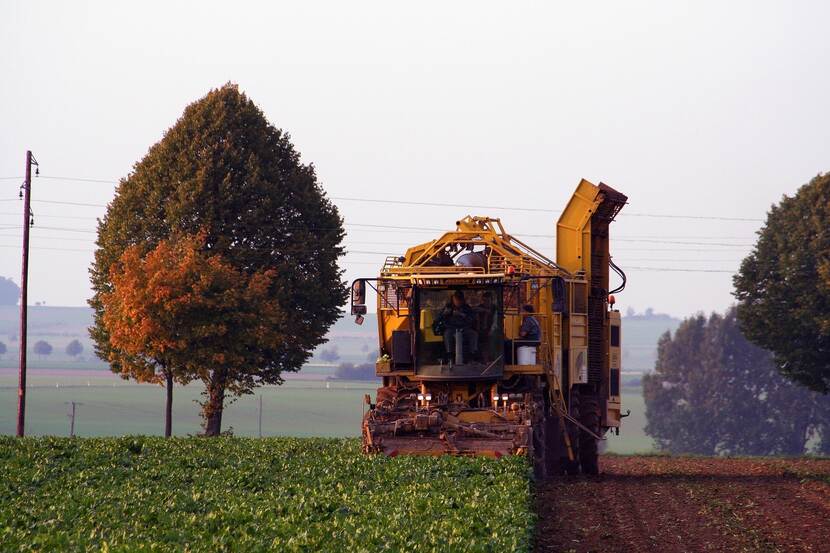Serbia: The most stable crop of recent years sells at an excellent price
Increases in farming of succesful crop; wildfire damages in Serbia forests; beef import far exceeds export; free trade agreements present new opportunities - Our weekly briefing on agriculture, food and nature news in Serbia.

Sugar beet brings highest profit for agricultural producers
The company Sunoco, a member of the MK Group, one of the biggest agricultural companies in Serbia, has once again organized the traditional Sugar Beet Field Days in Vrbas, Kovačica, and Ljukovo village near Inđija in mid-June.
Discussions with producers were focused on new technologies and yield increase. Slobodan Kosutic, Director of Sunoko, stated that sugar beet has proven to be the most stable crop in recent years, thanks to the company's investments and the strong collaboration it maintains with agricultural producers. "The excellent price of sugar beet compared to other crops, along with the possibility of advance financing for production through quality raw materials and financial incentives, has contributed to the continued growth trend in sugar beet production by approximately 14% in 2024," Kosutic said. He added that Serbia has significant potential in sugar production, especially in terms of increasing exports to European countries, and this opportunity should be seized.
This year, sugar beet has been sown on over 48,000 hectares in Serbia, with most of the sowing completed in the last week decade of March. Despite variable weather conditions, including drought in the latter part of sowing, late cold spells, and frequent and strong winds, the crops are in good condition and have a solid formation, a crucial prerequisite for achieving good yields. Kosutic also announced that the company will introduce an electronic dispatch system across the entire raw material area this year, aiming to digitize business processes to increase efficiency and reduce environmental impact.
Total damage in state forests one quarter million square meters
The total damage in Serbia's state forests in 2023, expressed in wood volume, amounts to 264,633 cubic meters, with nearly 24,000 cubic meters of damage caused by human activities, according to the Republic Statistical Office (RZS) website. Natural disasters such as wind, rain, hail, and snow caused damage amounting to 186,047 cubic meters, accounting for nearly 70% of the total damage in state forests. Significant damage was caused by a supercell storm in July 2023, particularly in the Vojvodina region. The remediation of these damages is ongoing.
In 2023, there were 13 recorded fires in state forests, damaging 680 cubic meters of wood. No fires were reported in private forests. Damage from plant diseases in state forests amounted to around 43,000 cubic meters in 2023. Data on forest damage is collected based on forest types and causes of damage, and it is reported in cubic meters for the volume of felled wood and in hectares for the affected area. The type of damages recorded in state forests include human activities, insects, wildlife and domestic animals, natural disasters, plant diseases, and fires. The reports were submitted by public forest management enterprises, SerbiaForests and VojvodinaForests, and public enterprises managing national parks.
Serbian beef imports exceed exports three times
Serbia had a negative balance of over €7 million last year in the trade of beef due to significantly higher imports than exports. Statistics indicate that this trend continues into the first quarter of 2024, with a negative balance already amounting to €4.35 million, reports daily Blic.
In the first four months of this year, data from the Statistical Office of the Republic of Serbia (RZS) show that Serbia imported 961 tons of beef, three times more than it exported. The value of these imports was slightly over €6 million. The most significant import category was frozen boneless beef – 453 tons worth €2.5 million, with most of this meat coming from Italy (330 tons) valued at €2.15 million, daily writes.
RZS data reveal that 350 tons of fresh or chilled boneless beef were imported, primarily from the Netherlands (280 tons), followed by Russia (50 tons) and Romania (12 tons). Last year, Serbia imported 2,219 tons of various types of beef worth €14.23 million. The largest portion of these imports was frozen boneless beef—1,093 tons worth €6.8 million, with the most significant suppliers being Italy and the Russian Federation. Regarding exports, Serbia exported 305 tons of beef worth €1.72 million in the first quarter of this year.
The largest quantities of exported meat were fresh or chilled beef carcasses and half-carcasses, totaling 125 tons sold to Montenegro. Last year's beef exports from Serbia amounted to 1,482 tons worth €7.12 million. The majority of these exports were frozen beef with bones to China—435 tons worth €412,000. Additionally, 226 tons of frozen boneless beef worth €758,000 were exported to China.
Free Trade Agreements are great opportunities for the Serbian economy
At the Serbian Chamber of Commerce, Mr. Tomislav Momirovic, Minister of Domestic and Foreign Trade highlighted that free trade has significantly benefited Serbia’s economy by creating jobs and reindustrialization opportunities. Serbian exports increased by over 300% in 2023 compared to 2012, while imports grew more slowly, improving the trade balance by nearly 60%.
The Minister expressed confidence that the Free Trade Agreement with China, effective as from July 1st will fully exploit the opportunities of privileged access to the vast Chinese market. With existing agreements with the EU, CEFTA, the Eurasian Union, Turkey, EFTA, and the UK, Serbia already has access to markets with 800 million people.
The new agreement with China expands this to over 2,2 billion people. Momirovic believes the FTA with China will benefit both large companies and SMEs by opening up the Chinese market. The Ministry of Domestic and Foreign Trade's website now has a section dedicated to information about the Free Trade Agreement between Serbia and China.